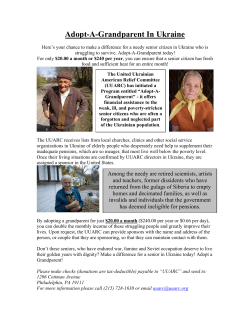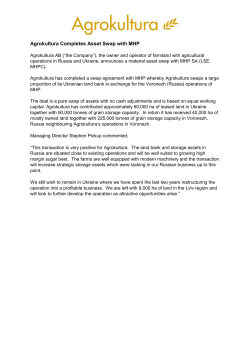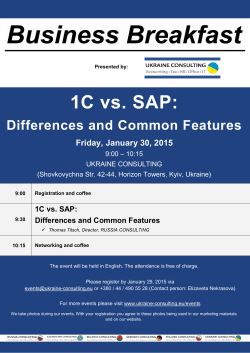
Fighting the Kremlin Myth Machine
31 Chief of Defence Staff General Tom Lawson and Prime Minister Stephen Harper as the government announces additional military resources to help and train Ukrainian defence forces. In April, the government announced it would be sending up to 200 Canadian soldiers in a training and noncombat role. PMO photo, Jason Ransom Fighting the Kremlin Myth Machine Raynell Andreychuk The annexation of Crimea and Russia’s subsequent shadow war in Ukraine mark not just an unprecedented phase of expansionism from President Vladimir Putin, the events of the past year have been accompanied by an explosion in a new form of warfare. The new Russian propaganda isn’t just a biased rendition of history in the making. It is a mass-scale burlesque of journalism that trades in false narratives and degrades the value of truth. T he conflict in eastern Ukraine has entered a new phase. International support and encouragement is helping Ukraine’s government to press forward with vital reforms while managing the ongoing insurgency on its eastern border with Russia. The NATO alliance continues to reaffirm its opposition to the illegal annexation of Crimea, and any further attempts to redraw Europe’s borders. The European Union, Canada and the United States are providing assistance to help Ukraine and other Eastern Partnership countries pursue muchneeded democratic and economic reforms. Meanwhile, the Minsk Accords remain the basis of an increasingly fragile and temporary lull in the violence in Luhansk and Donetsk, with signs that spring might bring new escalations. Canada is also deploying 200 troops to Ukraine this summer, where they will join US and UK military advisers in a training mission for Ukrainian forces in the western part of the country, well removed from the conflict in the East. The Canadians advisers will be unarmed. Commentators have been all too eager to draw parallels between present conditions and Cold War realities; for those who lived through the 1950s and 60s, Russia’s ongoing efforts to entrench its influence in Eurasia, and to exploit European and North American countries’ internal May/June 2015 32 economic and ideological divisions, can seem all too familiar. Away from the contact lines, however, the war of politics and ideas has been anything but static. Whatever the ultimate objectives of this new, communications-driven front of Russian provocations may be, European and North American leaders are wizening to a new set of tactics that suggest the Kremlin is neither constrained by Cold War modalities, nor ready to put its broader ambitions on ice. M ore than a year since Crimea was invaded by socalled “little green men”, the Kremlin’s use of unorthodox means to achieve its foreign policy objectives comes as little surprise. The expression “hybrid warfare” gained new currency as NATO sought to describe the unique confluence of tactics employed in eastern Ukraine. Characterized by the use of unidentified or proxy forces to carry out low-intensity armed offensives, and complemented by non-military subversive activity, the particular breed of hybrid warfare being waged today by the Kremlin is underpinned by the persistent and unrelenting denial of state involvement and the construction of alternative narratives. Leveraging traditional media and more modern technologies alike, the Kremlin’s well-resourced communications front has its sights set on the established norms and principles of international law and engagement, which it portrays as innately frail and opposed to Russia’s national interests. Building on the state’s control of the media in Russia, and the influence of that media in Eurasia, the Caucasus and elsewhere, the Kremlin today is aggressively expanding this information offensive to reach new audiences, countries and language groups. Last November, Russia announced the launch of a new international media organization. ‘Sputnik,’ as the agency is known, will offer 800 hours daily of news media programming in 30 languages, produced by hundreds of foreign correspondents in over 130 cities and 34 countries. Policy The war of politics and ideas has been anything but static. Whatever the ultimate objectives of this new, communications-driven front of Russian provocations may be, European and North American leaders are wizening to a new set of tactics that suggest the Kremlin is neither constrained by Cold War modalities, nor ready to put its broader ambitions on ice. It has the stated objective of offering an alternative to so-called ‘Western interpretations of world events.’ Put differently, it is part of a new Russian information offensive that draws little distinction between news reporting and fictitious media production. T he Internet is awash with commentary debunking some of the most egregious examples. Perhaps the most often-cited involved a television report by Russia’s Chanel One last July, in which a female interviewee claimed that Ukrainian forces had crucified the wife and three-year old son of a separatist insurgent. No other evidence was produced, and the interviewee was later revealed to be a regular “witness” to uncorroborated events portrayed in Russian news reporting. Another story by the same agency used badly doctored satellite images to “prove” that Malaysia Airlines Flight 17 had been shot down by a Ukrainian fighter jet. In early April, Russian television stations reported claims that a 10 yearold girl had been killed amid shelling by Ukrainian forces in the Petrovsky region of Donetsk. When a BBC journalist travelled to the village where the incident was alleged to have happened, however, local residents said they knew nothing of the death and denied that there had been any shelling during the days in question. Another report by the leading Russian tabloid Komsomolskaya Pravda claimed that American intelligence services orchestrated the attack on the satirical magazine Charlie Hebdo. A “political scientist” quoted in the piece explained that the attack was launched to punish French President Francois Hollande for suggesting that sanctions against Russia should be reconsidered. For every such outrageous example of the Russian media’s mockery of journalistic ethics, the Kremlin has sponsored many more nuanced and sophisticated alternative narratives of world events. Supporting these efforts from so-called “troll factories” in and around Moscow, hundreds of young Russians are accused of posting comments on news sites, delegitimizing stories that run counter to the Kremlin’s messages. A ccording to a seminal report by The Interpreter and the Institute of Modern Russia, The Menace of Unreality: How the Kremlin Weaponizes Information, Culture and Money, “Since at least 2008, Kremlin military and intelligence thinkers have been talking about information not in the familiar terms of ‘persuasion,’ ‘public diploma cy’ or even ‘propaganda,’ but in weaponized terms, as a tool to confuse, blackmail, demoralize, subvert and paralyze.” Or, as Canada’s former minister of Foreign Affairs, John Baird, put it in a speech to the NATO Council of Canada last November, “The old Soviet concept of Active Measures is starting to be talked about again, measures aimed at polluting the opinion-making process in the West…. The biggest challenge to truth in this generation is the active manipulation of information.” As Sputnik begins appearing amongst the top hits for news searches in a new range of languages, and as Kremlin-sponsored reinterpretations of current and historical events continue to gain traction among extremist parties in Europe and elsewhere, 33 to NATO countries’ growing awareness of the need to uphold a principle contained in the Preamble to the Constitution of the United Nations Educational, Scientific and Cultural Organization (UNESCO), which in 1946 reminded us that, “Since wars begin in the minds of men, it is in the minds of men that the defences of peace must be constructed.” events in Ukraine.” Ukraine Today, by contrast, was launched in August 2014 as a high-quality “Englishlanguage news channel focusing on Ukraine, Eastern Europe and the former Soviet Union.” The Internet television station Espresso TV, for its part, gained international recognition for its live-streaming of the Euromaidan protests. Today it has a reputation for “accurate and objective reporting he United States and the Eu- of political, social, and cultural life ropean Union are also rein Ukraine” with the aim of uniting sponding to the Kremlin’s in“those who care about democratizaformation war. tion of Ukraine.” In a 411 to 10 vote on December 4, s the international commu2014, the US House of Representatives nity works with Ukraine to deadopted a resolution that calls on the velop an effective response president and the State Department to Kremlin disinformation, means to “evaluate the political, economic, should continue to be sought to proand cultural influence of Russia and Russian state-sponsored media” and mote the diversity of perspective and to “develop a strategy for multilateral freedom of speech represented by ‘necoordination to produce or otherwise tizens’ and media-philes in Ukraine procure and distribute news and in- and elsewhere, and to help amplify formation in the Russian language their voices to compete effectively to countries with significant Russian- with Kremlin-backed media. speaking populations.” Amid these efforts, Russians themOn January 15, 2015, the Europe- selves must not be forgotten. an Parliament adopted a resolution After all, besides the Tatars and others strongly condemning Russia’s “unstruggling for safety and survival in declared hybrid war against Ukraine, Crimea and the Donbass, it is Russians including information war, blending who are suffering the greatest effects elements of cyber warfare, use of reguof a crippled economy and reduced lar and irregular forces, propaganda, freedoms, including freedom of inforeconomic pressure, energy blackmail, diplomacy and political destabiliza- mation. For all the shortcomings in tion.” The resolution further calls on Russian democracy, the energy with the Commission and the Commis- which the Kremlin has sought to consioner for European Neighbourhood trol information and opposition withPolicy and Enlargement Negotiations in Russia reveals a deep preoccupation to prepare “a communication strategy with how Russians’ view its policies. to counter the Russian propaganda Indeed, as the Kremlin continues in its campaign directed towards the EU, bid to maintain Russia’s social cohesion its eastern neighbours and Russia it- through repression and disinformaself, and to develop instruments that tion, there is no shortage of evidence would allow the EU and its Member that President Putin’s control over inStates to address the propaganda cam- formation inside Russia and an ability paign at European and national level.” to project disinformation abroad have T Senator Raynell Andreychuk, head of the Canadian Election Observation Mission in Ukraine at a briefing before the presidential elections there in 2014. CANEOM photo the Kremlin’s global war of disinformation demands a concerted international response. “Hybrid warfare is a probe, a test of our resolve to resist and to defend ourselves,” NATO Secretary General Jens Stoltenberg told a seminar on NATO Transformation on March 25. “And it can be a prelude to a more serious attack; because behind every hybrid strategy, there are conventional forces, increasing the pressure and ready to exploit any opening. We need to demonstrate that we can and will act promptly whenever and wherever necessary.” Our ability to resist the Kremlin’s information war rests on the ongoing resolve of member states of the NATO Alliance, and of others who value basic human rights and freedoms. Canada has and continues to support a host of initiatives designed to strengthen Ukraine’s resilience as a rights-respecting democracy, and to counter the destabilizing effects of Russian propaganda. In addition to targeted sanctions, travel bans, participation in NATO reassurance measures, military training, support for key economic sectors and programs aimed at fostering religious tolerance and reconciliation in Ukrainian civil society, for example, Canada has also been an early supporter of NATO’s Strategic Communications Centre of Excellence. A Although the EU’s communication strategy had not yet been made public at the time of this writing, a number of Ukrainians and others are already actively engaged in debunking and countering Kremlin disinformation. Stopfake.org, for example, is a website in English, Russian and Ukrainian Established in Latvia in January 2014, whose mission is to “refute distorted StratCom COE is a central response information and propaganda about become the centrepiece of his new international power politics. Raynell Andreychuk, a Conservative Senator from Saskatchewan, serves as Chair of the Standing Senate Committee on Foreign Affairs and International Trade. She has led Canadian delegations observing the last presidential and parliamentary elections in Ukraine. raynell.andreychuk@sen.parl.gc.ca May/June 2015
© Copyright 2025









